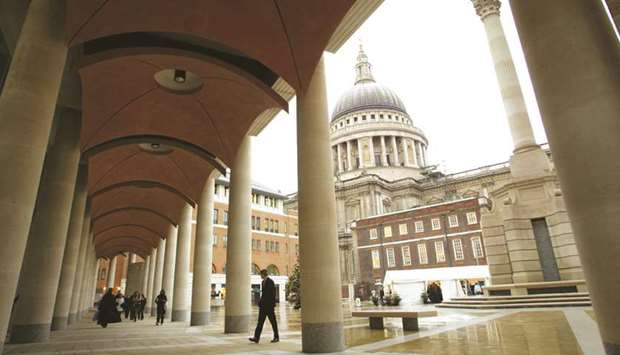Global stock markets moved gingerly on Friday, with Europe posting modest gains while Wall Street dipped as traders weighed coronavirus vaccine hopes against lockdowns and the lack of a new US stimulus deal.
In Europe, both Frankfurt and Paris ended the day with a gain of 0.4%, while London added 0.3%. But in late morning trading in New York, the Dow was down 0.3% and the S&P 500 slid 0.2%. The tech-heavy Nasdaq Composite managed a 0.1 gain.
“The small gains in Europe and modest losses in the US sum up an indecisive session for stock markets, and indeed, apart from the initial huge rally on 9 November, an indecisive three-week period,” said Chris Beauchamp, chief market analyst at online trading firm IG.
The November 9 rally was triggered by the announcement that the vaccine developed by Germany’s BioNTech and US giant Pfizer was 90% effective according to early trial results.
It has subsequently said the effectiveness is 95%, and announced on Friday it is preparing to file an emergency request for authorisation to roll it out and help defeat a disease that has killed almost 1.4mn people and infected close to 57mn.
Moderna has also said trial results have shown its vaccine to be 95% effective at preventing Covid-19.
Given the degree to which the virus has upended the world economy, the news has helped push stocks higher, with the Dow hitting a new record high and approaching the 30,000 points level.
“In light of the vaccine stories, it feels like stocks could be in limbo for a while until we find out about the vaccine situation — in either direction,” said market analyst David Madden at CMC Markets UK.
“Seeing as a lot of progress has been made with respect to coronavirus drugs, it seems like a floor has been put in place under equity benchmarks now, but that could all change should the drug story get derailed,” he added.
Traders have also been closely monitoring the prospects of a new deal on US stimulus materialising after the president of a regional Federal Reserve bank warned Thursday the United States could see growth contract again in the fourth quarter.
In the aftermath of the presidential election, moves to agree a new stimulus package to support the virus-ravaged US economy remain deadlocked.
“The move by the Department of Treasury to allow some of the Fed’s emergency lending programs to expire at the end of the year is also garnering attention but the market reaction thus far has been muted,” said analysts at Charles Schwab brokerage.
Markets have also been buffeted by fears of where the virus is going as infections and deaths continue to mount and with European governments forced to impose fresh lockdowns.
Major US cities such as New York have also put strict containment measures in place and on Thursday California announced a curfew across almost all of the state.
Tokyo has raised its virus alert to the highest level.
“There’s the push-pull of short-term versus long-term and that’s what investors are looking at right now,” Chris Gaffney, at TIAA Bank, said. “There are some very serious risks in the short term, especially with the lockdowns.”
Meanwhile sterling was on course for its third consecutive week of gains against the dollar on Friday, driven by renewed hopes that Britain and the European Union will reach a trade deal.
Britain left the EU in January and is in talks with the bloc on a future trading relationship after a transition period runs out at the end of 2020.
An EU official said the two sides are very close to agreement on most issues, even if they are still at odds over fishing rights, guarantees of fair competition and ways to solve future disputes.
European Commission President Ursula von der Leyen pointed to progress on “important files”. A spokesman for Prime Minister Boris Johnson also reiterated that Britain wants to secure a trade deal as soon as possible, but it needs respect the country’s sovereignty.
The EU and British officials’ words reassured investors that negotiations are still ongoing after chief Brexit negotiators suspended direct talks on Thursday when a member of the EU team tested positive for Covid-19.
“For some weeks GBP has been supported by the view that some kind of deal will be announced this month.
This is still the favoured outlook, though scope for any relief rally is set to be limited by the likelihood that any deal will be a skeleton one”, said Jane Foley, head of FX Strategy at Rabobank.
The pound gained 0.3% to 89.23 pence per euro and it was on course for its second week of gains against the European single currency.
Versus the dollar, sterling was up 0.2% at $1.3287, on track for its third consecutive week of gains..Analysts at ING said that there was scope on the upside for sterling against the dollar, while they saw limited upside versus the euro given the lack of a “material announcement on the negotiations”. Foley added that if “no compromise is announced next week, growing fears about a no trade deal situation are likely to creep back into the market leaving GBP vulnerable”. On the other hand, if a trade deal is agreed, Kit Juckes, chief FX strategist at Societe Generale, said in a note to clients that he expects sterling to reach 0.85 pence per euro.
In London, the FTSE 100 closed up 0.3% to 6,351.15 points; Frankfurt — DAX 30 ended up 0.4% to 13,137.25 points; Paris — CAC 40 closed up 0.4% to 5,495.89 points and EURO STOXX 50 ended up 0.4% to 3,466.88 points on Friday.

The walkway seen outside the London Stock Exchange building in Paternoster Square. The FTSE 100 closed up 0.3% to 6,351.15 points on Friday.
